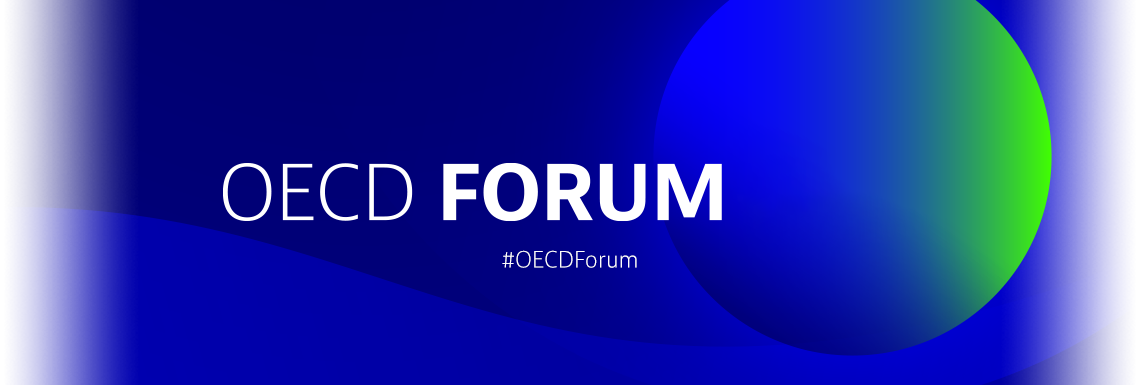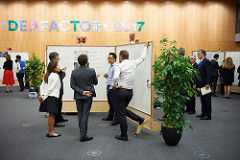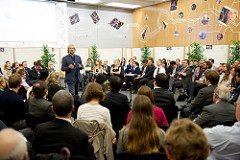OECD_IdeaFactory
2018 IdeaFactory sessions
Two public sessions will be held this year:
- OECD_IdeaFactory "Rebooting International Co-operation: High-Intensity Democracy" on 29 May, 10:00-13:00
2018 marks 50 years since the famous protests of 1968. In May of that year in France, the largest strike movement in Europe since the second world war brought the country to a standstill. In the United States, the assassination of Martin Luther King Jr., and the continuing war in Vietnam brought protestors to the streets. Now, as then, it seems that the intensity of democratic engagement often comes as a result of crisis or social breakdown.
Today, voting patterns and abstention are telling us that our democratic institutions are suffering from political disengagement, and possibly increasing irrelevance in the more digital, direct and fast paced 21st century. And yet, the online space offers a new “town hall”, extending beyond national borders, allowing people to share new ideas to proactively shape public life. Digital technologies can be used for civic purposes, providing new and enhanced ways to revitalise democratic practices and innovate the way people and power-holders interact. What needs to change for citizens to feel more engaged in the democratic process and to restore dynamism in our institutions? How might we harness the energy evident in the protests of 1968 and the modern day equivalents, beyond the “crisis” point, to create what Roberto Unger described as a “high energy democracy”? Might this be the key to ensuring that we continue to have democracy?
This IdeaFactory will look at alternative governance models that might address the growing alienation that many of our democratic institutions are suffering from.
- OECD_IdeaFactory "Rebooting International Co-operation: Transforming Today’s Reality to a Vision for the Future" on 29 May, 15:00-18:00
A new wave of populism and public disquiet is challenging the current model of economic globalisation. For many, multilateralism has come to represent a rather distant, self-serving and technocratic “system”, removed from the everyday aspirations and concerns of people. The resulting backlash, fueled and facilitated by new modes of digital communication, notably in some of the countries that have traditionally been the most fervent supporters of globalisation, is leading to serious concerns about the potential unravelling of international norms, standards and institutions. Against this backdrop, serious questions need to be asked about how a system of international co-operation designed in the 20th Century needs to adapt to the realities of the 21st Century, securing the “social license to operate” needed for achieving policy and societal impact. Looking forward, what new models of collaboration will be needed and how can these models be built? How can we pool and share collective knowledge, and make better use of human creativity, increased connectivity, innovative technology and systems to find different ways of working towards solutions. Indeed how might we need to think differently about purpose, beyond the traditional prism of problem solving?
This IdeaFactory will look at practical (and impractical!) approaches to developing more robust, future-proof international co-operation given our current situation. Collectively, we will develop alternative roadmaps to an alternative future.
How it works
|
In the OECD_IdeaFactory, there are no panels, podiums or formal presentations.
The IdeaFactory brings together a range of experiences, backgrounds and perspectives from across the policy shaping community in a highly interactive, engaging and very popular format.
Participants will not be provided with answers to the questions raised but rather will be tasked with finding answers themselves, working in small teams and by discussing these options in “fish bowl” sessions that involve all participants.
An experienced facilitation team co-ordinates the collaborative process that engages a group of 90+ participants over a three-hour period. |
|
Rediscover past IdeaFactories
- 2017 -
Two sessions were held:
- OECD_IdeaFactory "A Survivor’s Guide to a Post-Truth World" on 6 June 2017:
Post-Truth is a word on everyone’s lips – defined as the word of the year in 2016 by Oxford Dictionaries. While not exactly a new phenomenon, the speed, volume and reach of information flows in the current digital ecosystem has affected its magnitude, creating the perfect conditions for fake news to thrive, affecting public opinion and political choices. In the current environment, virality seems to be privileged over quality in the distribution of news. Combined with continuing low levels of public trust in “experts”, the consequences have also been drawn into sharper focus and are now being manifested politically.
We are now facing the uncomfortable reality that truth and fact are losing currency in decision making and democratic choices. Assertions which “feel right” but have no basis in fact seem to be accepted as valid on the grounds that they challenge the elite and vested interests. Furthermore, algorithms that sort us into groups of like-minded individuals, create social media echo chambers that amplify our views, leaving us uninformed of opposing arguments, polarising our societies, and with a significant impact on the democratic process.
This IdeaFactory brought together leading thinkers and practitioners from government, media, academia, business and civil society to confront this challenge and present solutions. It took stock of the many initiatives underway both in the public and private spheres, and placed a central emphasis on examining the unexploited space for action, exploring the boundaries between personal responsibility and choice, and broader safeguards for protecting and empowering citizens and voters.
- OECD_IdeaFactory "Me, Myself & A.I" on 6 June 2017:
In recent years, the rise of Big Data combined with increasing computing power has permitted key breakthroughs in Artificial Intelligence (AI). Self-learning algorithms already greet us on our digital devices, influence our purchases, govern our newsfeeds, and will soon drive our cars. As AI capabilities continue to progress, few domains are not – or will not soon be – impacted and transformed.
Through a combination of plenary sessions and discussions in smaller groups, this highly interactive workshop relied on each individual to bring its perspective on AI, with the aim of spurring innovative views and solutions through synergies of ideas. The IdeaFactory fed into further OECD work on Artificial Intelligence by discussing elements that should go into a high-level policy framework to ensure that AI develops in a human-centric manner and contributes to bridging divides.
Artificial Intelligence stands to help address key global challenges and deliver tremendous benefits in terms of efficiency, sustainability, health, well-being, and productivity, but it is also poised to engender significant challenges linked, among others, to privacy, liability, discrimination, employment, and oversight. By convening leading experts on AI and representatives from a broad spectrum of backgrounds and industries, the OECD_IdeaFactory entitled “Me, Myself & A.I.” explored the key economic, social, legal, and ethical implications associated with rapid advances in AI across a number of fields. Discussions focused on how to best harness the benefits of AI, whilst ensuring we are well-equipped to manage its risks.
- 2016 -
Two OECD_IdeaFactories were held on Tuesday 31 May 2016 which explored the overall themes of productivity and inclusive growth.
Check out the timeline featured in both sessions on the Digital Revolution.
"Disruption" is an over-used term, but it's not inappropriate when referring to the evolution of ways of working, and to the development of new skills, for new jobs, in new domains. People are no longer just preparing for jobs, but for multiple careers over the course of their lives. This IdeaFactory was an opportunity to discuss with the OECD Forum community the different strategies that may be pursued to adapt the skills taught in education and training systems to the changing needs of today’s and tomorrow’s employees and employers. How can these disruptions be leveraged to reduce inequality and stimulate productivity? How can different societal actors – policymakers, organisations, individuals – make a dent in this evolving context? During this IdeaFactory participants put new ideas at work with the aim of understanding their transformative potential and explored the nature of new possibilities. The debate also informed discussions at the Ministerial Council Meeting on 1 June and provided input for the new OECD-wide project on the Future of Work. |
- Digitalisation of Society - Read the report
As the technological revolution advances each millisecond with the tap of a finger and the linking of code, this IdeaFactory was an opportunity to discuss with the OECD Forum community the most critical challenges and the main dilemmas provoked by the current and future developments of the digital world. While some of the benefits of the Internet Age and “gig economy” are visible and abundant, we have yet to fully understand the unexpected consequences, such as the shift from collective to individual risk or the complicated relationship between privacy and security. How can we better align our policy and regulatory frameworks with the experimentation and innovation driven by these relentless waves of transformation? During this session participants put new ideas at work with the aim of understanding the transformative potential of new concepts, new possibilities and new challenges. The debate also informed discussions at the Ministerial Council Meeting on 1 June and provided input for the new OECD-wide project on the Digital Economy.
- 2015 & 2014 -
|
New Solution Spaces: The Pre-2060 Agenda (2015)
|
Related Documents



